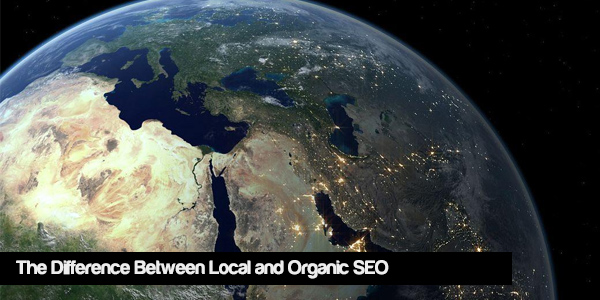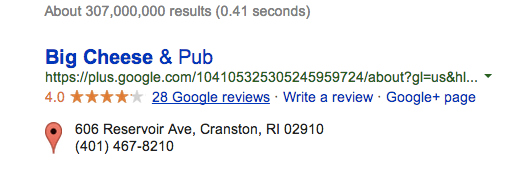Are you a business trying to find more customers in your local area?
If so, you may want to reevaluate your marketing efforts by investing your resources with local SEO (rather than solely organic SEO.)
10 years ago your business could make a killing by targeting customers through Yellow Pages ads. Remember those hefty books?
Well…times have changed.
With the continuous rise of consumers searching on mobile devices, the game for local SEO is now more important than ever.
According to Google and Bing, over 20% of desktop searches have local intent. For mobile searches it’s even higher, with around 50% of searches having local intent. These numbers are expected to rise.
More businesses have caught on to these facts, which has made the criteria for local rankings increasingly competitive.
Don’t get left behind in the evolving trend of how customers find your business.
Instead, get ahead of your competition by using the latest techniques in local SEO. Even if you understand organic SEO, it’s worth understanding the difference between organic and local results.
What is Organic SEO?
Organic search results rank based on their importance and relevance, despite whether the searcher is looking locally or not.
Basically, when you do a search on Google you will notice 3 types of results: organic results, local results, and Google Ads. Usually competitive keywords contain websites on the first page with relevant content, great on-page SEO, and strong back links.
The search engines have determined these top ranked sites are the most useful sources for consumers.
Organic search plays an important role in local search because it’s one of the several factors that help local search.
So what about Local SEO?
Have you ever done a search on Google for a business in your area? For example, let’s say you wanted to order pizza.
If you type in “pizza delivery” you see plenty of options on the first page. If you scroll past the ads, you notice organic results and local results.
The local results are labeled by either customer rating or alphabetical order (i.e. A, B, C) and have more information of the business such as the customer reviews, phone number, and address. You might also notice this in the Google Maps section.
What you see are the businesses’ Google+ Local Pages, and they are more than likely locally optimized.
In this scenario, the search engines recognize your search because of geographically related keywords. They believe you have local intent when you type “pizza delivery.”
Should my business focus on local search?
If you run a business that sells a product or service in your geographical area, then local search will be a great addition to your marketing plan.
The big question – How to optimize for local SEO
Now I already mentioned your organic search results help your local search results. That’s because local SEO is actually a combination of two things: your organic results and your social media, including directories.
Being that the local results on Google are Google+ Local Pages, it’s important to understand how they rank a listing.
There are three things that Google considers:
- Geographical location – If your business is, for example, downtown, then you have an advantage when consumers in the city are doing their search. If you’re located in the suburbs or a town right off your main city, then it makes more sense to optimize your keywords for that specific area.
- Reviews and ratings – Not only do reviews help your conversions by making it more likely for people to click on your listing, but your rankings are effected positively with the more you have.
- Citations – Also known as directories or business listings (think of Yelp), citations are references of your business’ Name, Address, and Phone number (SEO specialists refer to this as your NAP.) It’s VERY important to keep this information as accurate and consistent as possible.
A good rule of thumb in local optimization is taking control of what you can.
In this case, you probably won’t change your location anytime soon. So make sure to optimize for the city or suburb you’re actually located in.
For your reviews, it’s incredibly helpful to encourage your customers to write a review—as long as you abide by the guidelines. For example, Yelp has a strict policy for businesses to ask for reviews. And Google+ has cracked down on hiring third parties who write fake reviews.
Yep, that means no fake accounts or self-made reviews!
The last option which you can control—citation building (listing your business info in as many directories as possible.)
Citation building – Improving your online presence and rankings
Citation building will dramatically help you with your local search results.
This process involves getting your business info (remember, your NAP – Name, Address, Phone number) in the directories such as Yelp, Foursquare, and Merchant’s Circle.
There are hundreds out there, so it’s good to know which ones are important to take the time and claim. Some directories are more industry-specific (think doctors, restaurants, or attorneys), while others are more location-specific (used more in the area.)
You NEED to make sure your citations are accurate and CONSISTENT.
Why is this so important? Consistency with your business information is the main factor for Google to establish trust. And we all know Google favors trust.
In fact, inconsistent information will actually hurt your rankings.
So if you’re a local pizza shop in Chicago and are listed as “Anthony’s Pizza” on your Google+ Page and “Anthony’s Pizza Shop” on your Facebook, this will affect you negatively.
Make sure all of your directories have your DBA (Do Business As) name spelled exactly the same across the board. Do the same for your phone number and address.
Although keeping your NAP (Name, Address, Phone) can seem like an overwhelming task at first, it’s easier to start by claiming your local business information with the main data aggregators that send information to local search engines.
You can start by claiming or submitting your business information through the four main aggregators: Infogroup, Acxiom, Factual, and Neustar Localeze.
Customer Reviews
When you do a search with local results, you will notice the reviews and ratings right next to each listing.
Not only do great customer reviews help your CTR (click-through rate) by setting you apart from the competition, but they also help your rankings.
Think about it. If you’re looking up a dentist in your area, are you going to pick one without any reviews or the one with 25 positive 5 star reviews?
That’s why it’s important to come up with a review acquisition strategy to ramp up those ratings for your business. But again, be careful because Yelp and other directories have strict guidelines for soliciting reviews.
What NOT to do:
- Hire a third party to post fake reviews.
- Write your own fake reviews.
- Write a review based on someone else’s behalf.
- Get a ton of reviews at once – it might turn on filters and cause them to be deleted.
What you SHOULD do:
- Let customers review on the sites they prefer. The diversity will help.
- Make an easy-to-read sheet for your customers on where to go to write reviews.
- Link your review listings on your site.
- Follow up after service and request for reviews.
If you have a business that will be around for a while, then slowly acquiring those reviews will help you in the long run.
Get started today
So if you’re a business that gets customers primarily in your area, then local SEO is a must.
Now that you have a better understanding, start taking the steps today in strengthening your online presence.
Don’t get stuck in the Yellow Pages era.
 Rob Walling runs popular long tail keyword tool HitTail and he wrote the book on small software startups. In his spare time, he co-hosts one of the leading podcasts for bootstrapped startups, called Startups for the Rest of Us.
Rob Walling runs popular long tail keyword tool HitTail and he wrote the book on small software startups. In his spare time, he co-hosts one of the leading podcasts for bootstrapped startups, called Startups for the Rest of Us.
More about Rob Walling | @robwalling
The post The Difference Between Local and Organic SEO (And Why it’s Crucial for Your Business) appeared first on Top 5 SEO.
Source: Top 5 SEO
The Difference Between Local and Organic SEO (And Why it’s Crucial for Your Business)


No comments:
Post a Comment